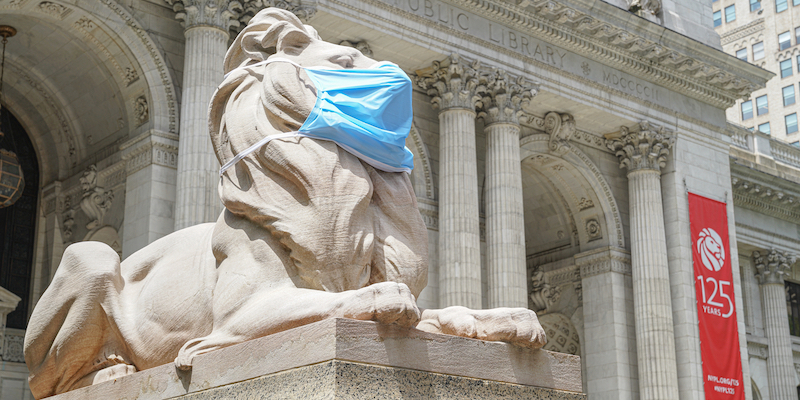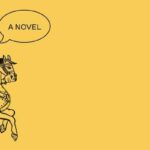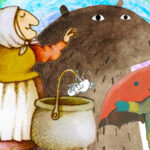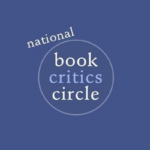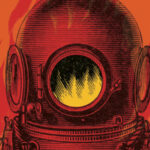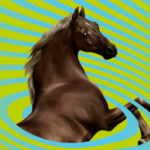How My Library Patrons Unexpectedly Helped Me Finish My Novel
Laura Sims on Creating a New Worldview
In September of 2020, I started working more regularly at my local library, and not exactly on purpose. It was a tumultuous time: the world was reeling from COVID-related chaos, illness, and death, and our country was beginning to reckon, finally, with racially motivated murders by police. In the midst of this, I had my own private, puny sorrow—one that hardly mattered in the grand scheme of things, but wrecked me all the same: I’d written a second novel that no one wanted to publish.
I knew rejection well by then, of course, having been a writer all my life, but because this failure followed a successfully published first novel, it pierced my thickened skin. I was told by numerous well-meaning writer friends that books failed to sell all the time, even books by writers I knew and revered. That gave me some comfort, but still, I suffered, and became insufferable, even to myself.
I told myself I would never write another book again—much less sell one—and that our family would lose our hard-won house, have to leave town, and move in with my husband’s parents, who lived on the opposite coast. My toxic internal voice told me I’d ruined everything with this failure of mine—and I firmly believed it.
Around this time, my supervisor at the library called to ask if I’d be willing to take on more hours. Some staff members were—understandably—concerned about returning to public-facing work, so she needed others to step in. In my previous life, I would have hesitated over losing precious writing hours, but now I gave a quick, emphatic yes, and began working more often.
It was a relief to step out of my house, and out of my wallowing state of mind, to walk to work along the path to town. While I noticed sparrows and starlings in the trees, and the bright sparkle of the sun-dappled river, I felt an instant uplift at the prospect of frequent work: I would be distracted from my troubles, I would make some much-needed money, and I would serve the public, who were greatly in need.
We were one of only a few institutions open to the public at the time; it was us, the hospitals, and grocery stores. I was glad to have what felt like a noble purpose; to be of use. Who needed writing anyway, in this tumbledown world? I tried to put it out of my mind.
I had my own private, puny sorrow—one that hardly mattered in the grand scheme of things, but wrecked me all the same: I’d written a second novel that no one wanted to publish.I worked at the Reference Desk, and mostly answered phone calls, as many patrons were still wary of coming in person. Of the calls we received, very few were actually reference-related, but I’d already grown accustomed to that.
There was Breakfast Man, for instance, who called every Friday with an order: two eggs over easy, a side of bacon, hash browns, and lightly buttered toast. I would say, “Coming right up,” and we’d chuckle together before he asked me to look up a phone number for him. Car Show Man wanted me to read him the schedule of upcoming car shows in the area. Alternately, he had me search for obscure 1950s memorabilia, and once he had me track down a place where he could buy Dr. Brown’s Celery Soda in town (I sought the soda out myself and tried it. It was surprisingly good, at least for the first few sips).
Another regular, who came in person, brought images on her phone: stock photos of funny cats and dogs, a random shot of a ceiling light fixture, pictures of Disney princesses. She had me arrange these in a careful collage before printing them—in color, of course. I took more pride in that work than I probably should have, but it felt good, after my own creative failure, to create something for someone else, something they cared about, however random the content seemed.
There were some patrons I only encountered once: the woman with impaired vision who called me a “doll baby” after I helped her scan and send two documents; the man who became belligerent when I said he couldn’t sell DVDs to the library, only donate them; the elderly patron who asked if I thought it was safe for him to get a flu shot despite the burning pains in his arms and legs.
I felt invigorated by these encounters—even the troubling ones—which gave me windows into others’ lives, and taught me, slowly, how I might help them. Not help them in big, permanent ways—that was largely beyond our scope at the library. But even helping in small ways was crucial, especially then; a little tech assistance, kind attention, and temporary shelter could go quite a long way.
I came late to the library world, after working as an adjunct instructor of creative writing, literature, and composition for more than a decade, as many writers do. In my forties, I made the practical (or slightly more practical) decision to get my MLIS degree. Once I had that degree in hand, though, and had begun part-time work, I quickly found I wasn’t prepared for the real library at all.
In graduate school, we’d discussed the importance of digital equity, the value of highlighting banned books, and the need to ask guiding reference questions—all crucial components of library work—but we hadn’t discussed, say, what to do when asked for medical advice, or how to maintain your sanity while endlessly answering the same set of questions from a patron who worried that his public computer had been infected by a (make-believe) virus.
I’d been playing make-believe myself, though, imagining librarianship through the mist of what I remembered from childhood, when I’d spent Saturday afternoons with my divorced dad at our local branch in Richmond, Virginia. While he browsed books in the general collection, I would sit peacefully reading at a picture-book-covered table in the children’s room under the benevolent gaze of Mrs. Knottingham, the children’s librarian.
So when I thought of being a librarian, I imagined myself as a kind of Mrs. Knottingham, in a place of peace and devotion to the written word. The library is still that place, of course, but it is also a refuge for the lost, the displaced, the desperately lonely, and the mentally unstable. In the fall of 2020, I felt especially driven to serve this community—for reasons that were altruistic and self-serving at once.
That was when Glasses Woman first called. Her questions threw me: “How do eyeglasses work? How do they make you see?” Her voice was trembling; she told me she was scared. Scared of glasses? I wondered. I told her I didn’t know how glasses worked, but Google taught me enough to explain the basic mechanics: how the lenses bend light and bring it to the exact spot on the retina that allows you to see.
Glasses Woman wasn’t reassured by this, though. “So the light comes in through the lens?” she asked, sounding stunned. “It just…comes in through the lens like that?” I did my best to sound confident when I said yes. Still, she said the thought of glasses gave her anxiety attacks.
“I think too much,” she told me, a condition I understood.
“Think about something else,” I said. “Take some deep breaths and think about something that doesn’t upset you.”
I heard her ragged inhale and exhale, and found myself breathing with her. “That’s right,” I said. “Just breathe.”
I was channeling the soothing presence of Andy, the instructor on my meditation app, and even though I had the distinct sensation of not knowing what I was doing, I felt that I was, indeed, doing something, which was better than being at home, doing nothing, helping no one, least of all myself.
She told me she felt better. She thanked me. We hung up. I felt lighter, as if I’d accomplished something that might, I imagined, have more value in the world than that old, discarded writing habit of mine.
It wasn’t as though I’d cured her, though; she continued to call. After a while, she moved from glasses to fax machines: How do they send messages back and forth? I explained what I knew, and told her that no one uses fax machines anymore, so why should she be afraid of them? They were practically defunct.
That seemed to please her, and she hung up, temporarily satisfied. She soon switched to financial systems: How do checks work? If I write my son a birthday check and he cashes it, where does the bank get the money from?
Next came a fixation on how water and sewage move through a building. Then she returned to eyesight, but this time with a focus on the eye itself. Each of the topics she called about “scared” her; many of our conversations ended with me leading an impromptu meditation/breathing session that left me feeling better myself. It wasn’t that I pitied her or looked down on her from some height; I felt in need of soothing, too.
“I’m crazy,” she’d told me during that first call, and would tell me again during every call that followed. I always told her she wasn’t crazy, but what I wanted to say back instead was “I’m crazy, too,” because I felt plenty crazy myself: unable to write; full of bitterness, disappointment, and self-doubt; and trapped with everyone else inside Pandemic World.
I recognized, of course, that Glasses Woman was genuinely mentally ill—not temporarily unstable, as I was. But however temporary my own mental state was, it acted as a leveling force. And Glasses Woman and I, however different our circumstances, both sought relief from our troubles at the same place: the library.
As the weeks passed, I felt my suffering begin to lessen. I was meant to do this, I realized. I was destined to help this clueless patron scan a hundred plus pages for the IRS; I was made for empathizing with this woman anxiously awaiting the results of her medical tests. I was a bookish bartender, and some patrons began to seek me out during my shifts.
I went home feeling gratified. Maybe I didn’t need writing after all. Maybe I’d overestimated its value, its central role in my life. I could do this instead: throw myself into public service, let my writing ambitions drop away, forget what I’d done for pleasure, fulfillment, and connection since the moment I could hold a pen.
This new worldview worked for a while. But then, inevitably—and almost inadvertently—I started to write. Once, after talking to Glasses Woman, I reached for my pen and scribbled down something she said: The money comes from nowhere, goes everywhere. Then, I started jotting down notes when I spoke to anyone remotely interesting.
Soon, I was bringing a small notebook to work. It was surprising and not surprising all at once; the pleasure I’d found in my work at the library had eased my despair to the point that I could return to a fundamental truth: I loved to write. I needed to write. It helped me process the world, and tolerate living in it.
I started by writing without purpose or plan, but before long I knew I was writing a novel. I didn’t write it at work, the way my character in the novel I was writing did; I wrote at home, in the mornings as I’d always done. And then I’d go to work, and be outward-facing, approachable, and connected to real people. I’d fill up with that, and then I was ready to immerse myself again in an imagined world.
This back-and-forth became a feedback loop of the best kind, and the novel progressed quickly. Within months, I was sharing the draft with my agent and first readers; by the following spring, the novel had sold. It should be no surprise that How Can I Help You, my official second novel, turned out to be library-centered, with a “failed novelist” at its heart.
Soon, I was bringing a small notebook to work. It was surprising and not surprising all at once; the pleasure I’d found in my work at the library had eased my despair to the point that I could return to a fundamental truth: I loved to write.Glasses Woman still calls. In recent months, she’s become increasingly desperate; during one four-hour Sunday shift a few weeks ago, I spoke to her nine different times. Like other staff members, I’ve tried to direct her toward more professional assistance: to county social workers, or the new national 988 number for mental health crises.
But she balks at these; she doesn’t want that kind of help. She says the last time she had “that” kind of help, she ended up locked in a mental hospital, neglected in a narrow room for hours on end. So we go on answering her calls, looking up the mechanics of this or that household item, learning new things we generally don’t want or need to know. I admit that I’ve grown impatient with her. Despite knowing how mental illness works, I keep expecting her to move on—the way I have, since working through my own crisis.
It’s an unreasonable response, so I don’t let it show; I make an effort to be kind, and to answer her repetitive questions as best as I can. It’s my job, after all, and I even think of it as a way of thanking the library, of paying back my debt of gratitude. I also still genuinely want to help her—despite my own ineptitude and the scant resources at hand.
When she called the other day, and I’d exhausted all of my usual answers and Googled information, I tried a new tack: I told her to go outside and walk around. “I tried,” she told me when she called next, an hour or so later. “But I got dizzy and scared, so I had to come back in and lie down.”
It was sad that she couldn’t escape her apartment even for a short walk, yet I felt a slight stirring at her words. I could picture her outside, walking haltingly into the bright day, blinking at the sun, inhaling the fresh air and seeing flowers in bloom under a blue sky. That wasn’t at all how it looked, I’m sure; for Glasses Woman, the experience was scary, a failure, something not to be repeated. But the newly revitalized writer in me couldn’t resist turning it into something else: a pivotal moment. A little story of hope.
______________________________

How Can I Help You by Laura Sims is available via G. P. Putnam’s Sons.

